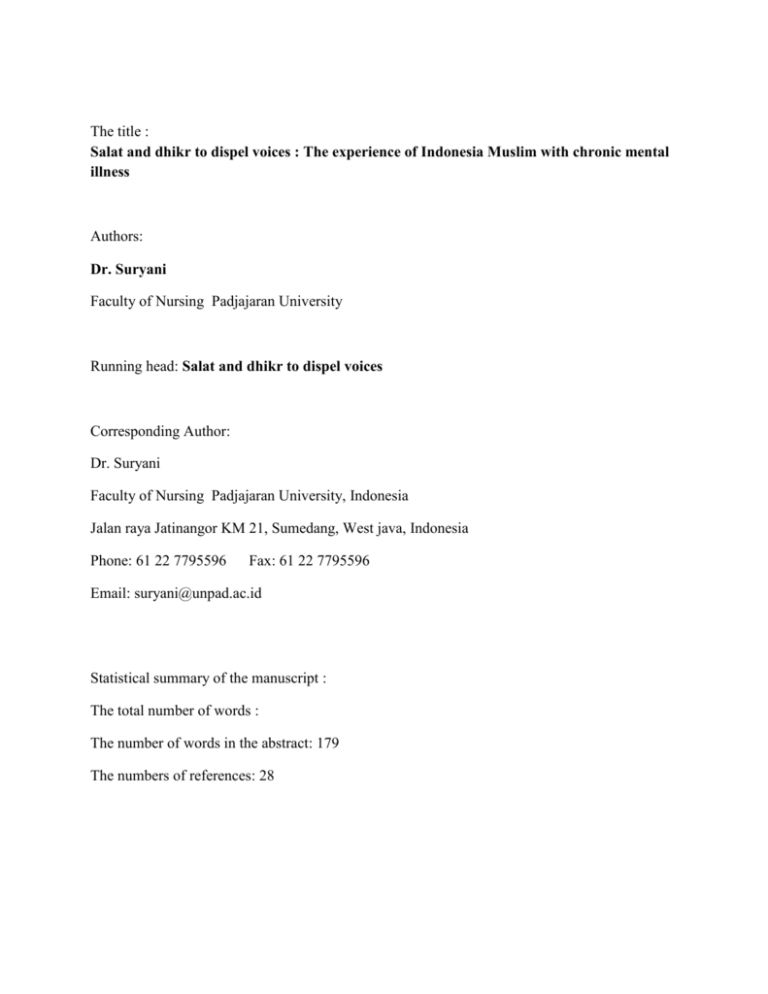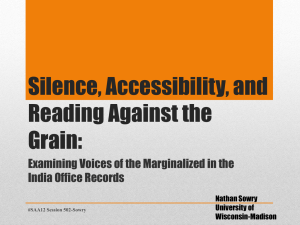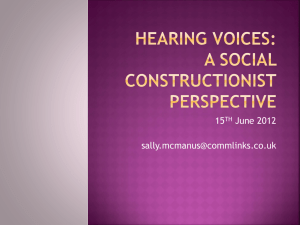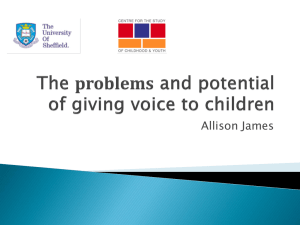Salat and dhikr to dispel voices - Malaysian Journal of Psychiatry
advertisement

The title : Salat and dhikr to dispel voices : The experience of Indonesia Muslim with chronic mental illness Authors: Dr. Suryani Faculty of Nursing Padjajaran University Running head: Salat and dhikr to dispel voices Corresponding Author: Dr. Suryani Faculty of Nursing Padjajaran University, Indonesia Jalan raya Jatinangor KM 21, Sumedang, West java, Indonesia Phone: 61 22 7795596 Fax: 61 22 7795596 Email: suryani@unpad.ac.id Statistical summary of the manuscript : The total number of words : The number of words in the abstract: 179 The numbers of references: 28 ABSTRACT Objective: The aim of this study was to explore the experience of dispelling voices as articulated by Indonesian Muslim with chronic mental illness. Methods: Descriptive phenomenological approach was applied in explicating the phenomenon of dispelling voices in this study. In-depth audio-taped interviews were conducted with 24 participants. Analysis of participant transcripts was undertaken using Colaizzi’s (1973) approach. Findings: The finding of this study confirm that the participants found a personal path to living with hearing voices by doing salat or dhikr every time they heard the voices. Three theme explicated from this study: The voices are related to evil and Satan, Salat and dhikr to dispel voices and the strength of faith had an important influence over the voices. Conclusion: This study challenges the existing conceptualization of dispelling voices to consider the religion or cultural background of the individuals. Key Word: dispelling voices, chronic mental illness, salat, dhikr Introduction: Hearing voices are potentially dangerous not only for people who experience them but also for other.1 Approximately 28% of people living with hearing voices consider suicide at least once per year.2 Hearing voices have been identified as the cause of self-harming behaviours.3 A study by McNiel, Eisner, and Binder found that 30.1 % of patients with hearing voices reported experiencing voices telling them to hurt others and approximately 22.3 % of these people said they had complied with the voices instructing them to hurt others.1 Yet, a significant number of people with chronic mental illness such as schizophrenia experience persistent hearing voices despite psychopharmacological treatment.4,5 Hearing voices affect the whole live of people who experience them.6 People who experience hearing voices reported that they cannot do daily activity and cannot relate to other. They felt anger, irritation and agitation, especially when they hear the voices frequently.7 (Johns, Hemsley & Kuiper, 2002). The unconfortable and disturbed presence of voices has led individuals to develop ways of coping to live with the voices.2,8 (Fallon & Talbot, 1982; Singh, Sharan & Kulhara, 2003) The literature demonstrated that listening to radio headphone is effective for dispelling voices.9 Similar findings were demonstrated by a single case study by Collins et al., 1989 in the UK that reported that listening to music and interesting conversations in a radio reduced the frequency of voices.10 While listening to uninteresting monologues or conversations and a blank tape had no effect eliminating the presence of the voices.10 Another single case study was carried out by Johnston et al., 2002 in the UK.11 The participant was treated using a personal stereo over a three week period. The three weeks involved one week with no treatment, one week with treatment and one week with control treatment. The findings of the study indicated that the use of a personal stereo could dispel the voices.11 However, as indicated in Johnston et al.’s study the use of such devices or being exposed to sounds had no effect on individuals’ self-esteem and belief about the voices. Unlike Feder,1982, Collins et al.,1989 and Johnston et al., 2002, A study in Japanese by Hayashi et al., 2007 of 144 people found that talking to someone and participating in hobbies such as playing games were the most effective coping strategies in dispelling voices, while retorting and reading aloud had minimal effect.12 Listening to appropriate and relaxing music was identified as being more effective than watching TV.12 Furthermore, Nayani and David,1996 found that watching TV triggered hearing voices because the voices commented on the television programs.13 Another study by Tsai and Chen, 2005 concerning self-management in people who experienced hearing voices using 144 people with chronic mental illness in Taiwan found that most of the patients developed their own distraction techniques such as ignoring the voices, engaging in activities, and accepting or arguing with the voices.5 As this was a self-report study of Taiwanese people, the findings of this study are only representative for this group of people. In addition, a cross-cultural study by Wahass and Kent, 1997 in UK found that individuals’ strategies in dispelling voices were influenced by their cultural background. The finding indicated that people from UK who experienced hearing voices tended to use distraction and physiological techniques while people from Saudi Arabia were more likely to cope with the voices using religious approaches.14 However, the finding of Wahas and Ken’s study did not explore in dept what religious approach were used by their respondent in dispelling the voices. This study aim to explore in depth the experience of Indonesian muslim with chronic mental illness in dispeling voices as most Indonesian (approximately 88 %) practice the Islamic faith.15 Research design Focus of the Study The research problem to be addressed in this study concerns the experience of dispelling voices. The research question which informs this study is: What is the experience of dispelling voices as articulated by Indonesian muslim people with chronic mental illness? Participant Selection and Access Purposeful sampling was used for the recruitment of participants. To achieve the goal of this research, the inclusion criteria for participation were Indonesian Muslim who experience chronic mental illness, attending the outpatient department of a mental health facility, reported hearing voices, able to provide informed consent, and willing to be a participant in this study. Exclusion criteria were, living with a co-morbid substance abuse disorder or organic impairment, a primary mood disorder, or having a severe cognitive deficit that would prohibit the person from participation in interviews. Participants were contacted in person by the researcher. The venue for contact was the Outpatient Unit of the West Java Psychiatric Hospital. At the time the participants were informed that they needed to be assessed by the attending psychiatrist in order to ensure they met the inclusion and exclusion criteria for involvement in this project. Information Gathering Information was gathered through in-depth focused interviews. Each participant was interviewed twice. The purpose of the first interview was to explore participants’ experiences of living with hearing voices while the purpose of the second interview was to provide the opportunity for the participants to review the transcript of interview and the findings of the study. The length of the first interview with participants ranged from 45 to 60 minutes. The interviews were conducted in the Out-patient Department of the West Java Psychiatric Hospital. With the consent of participants the first interview was audio-taped in order to gain a contextual understanding of the interview dialogue. All of the interviews were conducted by the researcher. Information Analysis Analysis of the participant transcripts utilized Colaizzi’s (1973) seven step approach.16 The narrative of participants from audio-taped interviews was transcribed. Each participant’s description was read and re-read in order to obtain an overall sense of the participant’s experience, and then extracted significant statements. In the next step, the researcher formulated more general statements or meanings for each significant statement, and then organised the aggregate formalized meanings into clusters or themes. Before getting the fundamental structure/ definition of the phenomena, the researcher wrote an exhaustive description of the phenomenon. The exhaustive description was validated with each participant. Ethical consideration In undertaking this project a number of ethical issues were addressed including: letter of approval, informed consent, anonymity, confidentiality, storage of data, level of risk, and right to withdraw without prejudice. Findings Twenty four participants were involved in this study. The ages of the participants were range from 19 to 56 years old. 10 participants are men and fourteen of them are women. sixteen of them are unemployed. Most of them have been hospitalized for 2 to 3 times. The voices are related to evil and Satan Most of the participants had experienced hearing voices for more than four years. Almost all participants said that the voices that they heard were related to evil and Satan. For example a participant, said: I think… the voices are Satan’s voices… Yes… Satan’s voices, because they also prohibit me from praying and suggest me to sleep… and sleep. In a similar vein, another participant stated: she [the voice] was like Satan… I am scared of Satan… Only Satan interferes with man…I am sure Farida’s voice is Satan’s voice… I hear Farida’ voices every ‘maghrib’ (evening time from sunset to 7 pm). The participants beleive that the voices are satan’ voices because the voices often disturb them and lead them to do bad things as stated by a participant: I think… the voices were Satan’s voices…. I am sure….they were Satan’s voices. Satan is always disturb people, doing bad thing to people and lead people to go to hell. I am sure they were not people voices…. Yes…. They were satan’ voices. The satans were disturbing and influencing my thoughts…… Salat and dhikr to dispel voices The participants sought help from Allah to dispel the voices. They seek releif from Allah by doing salat and dhikr. A participant stated: In my experience… if I hear her voice… I directly go to the bathroom to take an ablution and salat (ritual prayer which is performed five times each day: at dawn (al-fajr), midday (al-zuhr), afternoon (al-'asr), sunset (al-maghrib) and evening (al-'isha). I am afraid… I do not want to hear her voice anymore. From an Islamic point of view, salat is an activity that should be performed by all Moslems five times a day. Through salat, a Moslem is able to commune with Allah. Salat has several advantages for the person. Psychologically, the person performing the salat finds relief from the daily troubles of life including anxiety, fear, and pain as all of life’s difficulties are placed in the hands of Allah. Another participant also performed salat to stop the voices and to prevent relapse. In sharing her experiences she said: I always salat and read ‘Al Qur’an’ when hearing the voices…I simply pray… [and] hope I can recover and never have a relapse. She also turned to doing dhikr when the voices were present. Such a practice is encouraged by Islam as a means of finding relief and peace in being in communion with Allah. In a similar vein, another participant described how he experienced relief by doing ‘dhikr’ (remembering Allah by reading or saying the name of Allah): I just did ‘dhikr’ by saying Allahu Akbar [Allah is great] and Subhanallah [Glory to Allah]. I just performed ‘dhikr’ … until the voices stopped. ‘Dhikr’ is usually performed by Moslems after doing salat. It can also be used in any circumstance or situation such as when a Moslem hopes for something or worries about something. The participants performed dhikr to be free from the voices. For a participant, dhikr by saying astaghfirullah (Allah forgive me, please) was effective in stopping the voice of his wife which began occurring after leaving him to go to Saudi Arabia. He said: I just say astaghfirullah. Yes, I continue saying “astaghfirullah” until the voices stop. Invoking the saying astaghfirullah is a way a Moslem seeks Allah’s forgiveness. It is usually performed after ‘salat wajib’ (the obligatory prayers) which are performed each day. It is also performed every time Moslems realize that they have committed a sin. In the participant’s case, he invoked the word astaghfirullah when hearing his wife’s voice because he felt that he had sinned for not being able to perform his role as head of the household. Another participant discovered that dhikr by saying Allaahu Akbar was an effectively means of stopping the hearing voices. She said: In my experience in order to stop the voice just say ‘Allaahu akbar’, By saying ‘Allahu akbar’ for several times, alhamdulillah (thanks God) I can stop the voices. She stated further: No one taught me. I just tried it and it worked. Sharon shared her wisdom by suggesting: For patients who have similar experience to me they must always remember God by doing dhikr and salat, because dhikr and salat can enhance and strengthen one’s faith. The strength of faith had an important influence over the voices Some participants believed the strength of their faith had an important influence over the voices. They believed that if their faith was strong no voices would be heard. A participant described her experience by stating: I mean…it depends on how strong my faith is. If my faith was not strong enough, I would die ... yes ... it depends on how strong my faith is... If my faith was not strong enough, I would be finished off by her. In similar vein, another participant said In my experience if my faith was strong... I often do dhikr and salat... and so I can dispell the voices. But, when my faith was weak, I find it difficult to dispell the voices. Discussion As presented in the finding, most participants believed that the voices was satan voices. The finding of this present study is consistent with a study by Sylvia, Pierre-Yves, Laurence, Christiane, and Philippe, 2006 in switzerland in which one of participants in their study believe that her hallucinations and delusions are due to bad spirits.17 The findings of Wahas and Kent’s study, 1997 in the UK were also similar to the finding of this present study in respect of the belief that hearing voices are caused by Satan.14 The finding of this present study were also in line with the finding of a study by Kurihara, Kato, Reverger, & Tirta, 2006 in Bali, Indonesia in which the majority of the participants in their study reported that schizophrenia or chronic mental illness were caused by witchcraft.18 The majority of the participants performed salat and dhikr whenever they heard voices. They seek relief form Allah because they beleive that Allah is the most powerful and merciful, only by seeking help from him people can be protected from evil spirit. At times of seeking relief in Allah, participants turned to do salat and dhikr as a means of invoking Allah’s help. For a number of the participants the very act of engaging in doing salat was a potent means of stopping the voices. This finding is consistent with this researcher’s previous study where 22.5 % of respondents used praying to expel the presence of the voices.19 This finding is also supported by the findings of Lee, Chong, Chan and Sathyadevan’s study in which 25% of participants used praying to cope with the experience of hearing voices.20 This finding is also consistent with a study by Sylvia, Pierre-Yves, Laurence, Christiane, and Philippe, 2006 in Geneva who interviewed 115 people diagnosed with schizophrenia using semi structured interviews. The findings of their study indicated that 71 % of participants used religious practices as a mean of coping with voices.17 The finding of this study is also consistent with an empirical phenomenological study by Yip, 2003 in Hong Kong in which four participants from a Psychiatric Halfway House and an Outpatient Clinic were interviewed about their experiences of hearing voices and delusions. The findings of their study revealed that religious beliefs and superstitions impacted on the meaning attributed to the participants’ hearing voices and the way they cope with the voices.21 This has significant implication for work with cross-cultural population. For example, the use of salat and dhikr in dispelling voices was not only about seeking Allah’s assistance to be free from such intrusions, but also because they harboured a belief that the voices came from evil spirits such as Satan. According to Vandenbroeck, 2008, the majority of Indonesian people are Moslem and therefore, they believe that people who suffer from mental illness have a weak faith or lack the ability to believe in Allah.22 This alleged spiritual weakness provides fertile ground for Satan’s evil influences. An ethnographic study by Horikoshi-Roe, 1979 in West Java reported that Muslim Sundanese people view mental illness as a result of inadequate religious faith.23 Why highlighted? Similarly, another ethnographic study by Saptandari, 2001 in Java found that the developing of mental illness could be caused by lack of attention to daily religious practice and weak faith. If people are strong in their faith, they are less likely to become mentally ill. The faithful individual is protected by God from any form of disturbance that may lead to hearing voices or behaving in strange ways such as talking to oneself as a consequence of hearing voices.24 Furthermore, participants in this study believed that their strength of faith has a significant impact on the presence of hearing voices. This finding is supported by a previous study by Lindgren and Coursey, 1995 that was conducted in psychosocial rehabilitation in Maryland reference?. The study explored the influence of spirituality on the lives people with serious mental illness. Thirty participants took part in the study. The findings of the study revealed that spiritual belief had a positive correlation with patients’ recovery from their illness. Lindgren and Coursey,1995, suggested that people who have a strong spiritual belief feel a sense of comfort and being cared for, resulting in better outcomes.25 Harahap and Dalimunthe, 2008 in their book “Dahsyatnya doa dan zikir: agar diberi kesehatan, kekayaan dan kebahagiaan” (Enormity of prayer and dhikr: for given health, wealth and happiness) stated that dhikr can be reassuring because when we rely remembrance all matter to God, we will have sense of calm and peace in the hearts and minds.26 According to medical science, at the moment of remembrance Allah, chemicals (endorphins) come out automatically in the human brain. These substances resulting in a sense of calm and peace in the human mind because its function is similar to morphine.27 Limitations of the Study As this study was conducted by applying a phenomenological approach to inquiry in which deep and rich descriptions of the participants’ experiences of the participants were sought, only a small number of participants were involved in this study. Therefore the results of this study cannot be generalized to the broader population. However, the findings of this study have the potential to fill a ‘blind spot’ in knowledge about auditory hallucinations from an Indonesian perspective. Conclusion This study explored the experience of Indonesian muslim with chronic mental illness in dispeling voices. The finding of this study articulated that Indonesian muslim performed salat and dhikr to dispel voices. From the discussion above it can be argued that hearing voices have significant meaning for the individuals.28 The ways they dispel voices were influenced by their religious background. The findings of this research contribute to the literature on the way people dispel voices. This current study adds new understandings about the experience of dispeling voices from a different socio-cultural perspective to those of other studies. Acknowledgements : I would like to thank the Indonesia Directorate General of Higher Education that provided scholarship for my PhD study. References 1. McNiel, D.E, Eisner, J.P, and Binder, R.L. The relationship between command hallucinations and violence. Psychiatric Service. 2000; 51(10): p. 1288–1292. 2. Falloon, I.R. & Talbot, R.E. Persistent hearing voices: Coping mechanism and implications for management. Psychological Medicine. 1981; 11: p. 329–339. 3. Rogers, P., Watt, A., Gray, N.S., MacCulloch, M., & Gournay, K. Content of command hallucinations predicts self-harm but not violence in a medium secure unit. American Journal of Forensic Psychiatry. 2002; 13(2): p. 251–262. 4. Carpenter, T. Clinical constructs and therapeutic Discovery. Schizophrenia Research. 2004; 72: p. 69-73. 5. Tsai, Y. & Chen, C. Self-care symptom management strategies for hearing voices among patients with schizophrenia in Taiwan. Applied Nursing Research. 2005; 19(4): p. 191– 196. 6. Walton, J.A. On living with schizophrenia in I. Madjar & J.A. Walton (Eds). Nursing and the experience of illness: Phenomenology in practice. St Leonards, NSW: Allen & Unwin and London: Routledge (pp. 98-122), 1999. 7. Johns, L., Hemsley, D., & & Kuiper, E. A comparison of hearing voices in a psychiatric and non psychiatric group. British Journal of Clinical Psychology. 2002; 41: p. 81–86. 8. Singh, G., Sharan, p. & Kulhara, P. Role of coping strategies and attitudes in mediating distress due to hallucinations in schizophrenia. Psychiatry and Clinical Neurosciences.2003; 57: p. 517–522. 9. Feder, R. (1982). Auditory Hallucinations treated by radio headphones. American Journal of Psychiatry. 1982; 139: p. 1188-1190. 10. Collins, M.N., Cull, C.A., & Sireling, L. Pilot study of treatment of persistent auditory hallucinations by modified auditory input. British Medical Journal. 1989; 299: p. 431432. 11. Jonston, O. Gallaghar, A.G., McMahon, P. & King, D.J. (2002). The efficacy of using a personal stereo to treat auditory hallucinations: Preliminary findings. Behaviour Modification. 2002; 26 (4): p. 537-549. 12. Hayashi, N., Igarashi, Y., Suda, K., & Nakagawa, S. Auditory hallucination coping techniques and their relationship to psychotic symptomatology. Psychiatry and Clinical Neurosciences. 2007; 61: p. 640 – 645. 13. Nayani, T.H. & David, A.S. The auditory hallucination: A phenomenological Psychological Medicine. 1996; 26 (1): p. 179–192. 14. Wahass, S. & Kent, G. Coping with hearing voices: A cross-cultural comparison between Western (British) and non-Western (Saudi Arabian) patients. Journal of Nervous and Mental Health Disease. 1997; 185(11): p. 664-668. survey. 15. New World Encyclopedia Contributors. Religion in Indonesia. New World Encyclopedia. 2008. Retrieved May 19, 2012 from http://www.newworldencyclopedia.org/entry/Special:Cite?page=Religion_in_Indonesia 16. Colaizzi, P. Reflection and research in psychology: A phenomenological study of learning. USA: Kendall/Hunt Publishing Company. 1973. 17. Sylvia M, Pierre-Yves, B, Laurence, B., Christiane, G., and Philippe, H. (2006). Toward an Integration of Spirituality and Religiousness Into the Psychosocial Dimension of Schizophrenia. The American Journal of Psychiatry. 2006; 163 (11): p. 1952-1959. 18. Kurihara, T., Kato, M., Reverger, R. & Tirta, I. G. Beliefs About Causes of Schizophrenia Among Family Members: A Community-Based Survey in Bali. Psychiatric Services. 2006; 57 (12): p. 1795-1799. 19. Suryani. Hallucinations: characteristic and client’s efforts in managing the symptoms. Oral paper presentation at The International Nursing Conference on Holistic Care Nursing for Better Client’s Quality of Live. Indonesia, 2006. 20. Lee, T.M.Y., Chong, S. A., Chan, Y.H., & Sathyadevan, G. Command hallucinations among Asian patients with schizophrenia. Canadian Journal of Psychiatry; 49(12): 838842. 21. Yip, K. (2008). Traditional Chinese religious beliefs and superstitions in delusions and hallucinations of Chinese schizophrenic patients. International Journal of Social Psychiatry. 2008; 49(2): 97-111. 22. Vandenbroeck. Psychiatry and Belief in Indonesia. 2008. Retrieved August 10, 2008, from http://www.soc.world-journal.net/Java3.html. 23. Horikoshi-Roe (1979). Mental illness as a cultural phenomenon: Public tolerance and therapeutic process among the moslem sundanese in West Java. Indonesia (Ithaca). 1979; 28: p. 131-138. 24. Saptandari, P. Perspektif Kesehatan Jiwa: Kajian Antropologi. Universitas Airlangga/ paper presented at Konvensi National Kesehatan Jiwa I, Batu-Malang, Indonesia.2001. 25. Lindgren, K.N. & Coursey, R.D. (1995). Spirituality and serious mental illness: a two part study. Psychosocial Rehabilitation Journal. 1995; 18(3): p. 93-111. 26. Harahap, K.A. & Dalimunthe, R.P. Dahsyatnya doa dan zikir: agar diberi kesehatan, kekayaan dan kebahagiaan. Jakarta: Quantum Media. 2008. 27. Mustofa. Terpesona di Sidratul Muntaha. Surabaya: Padma. 2006 28. Suri, R. Making sense of voices: An exploration of meaningfulness of hearing voices in schizophrenia. Journal of Humanistic Psychology. 2010; 51(2): p 152-171.









